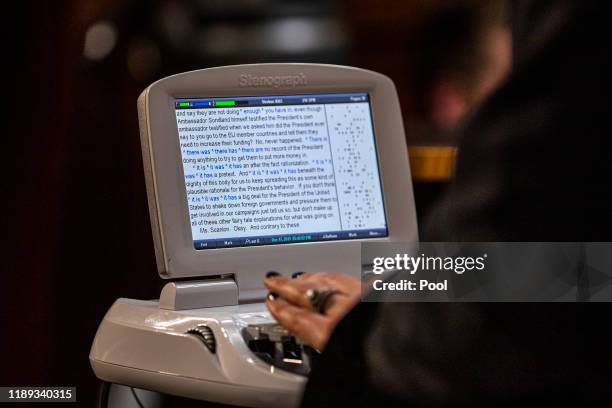Daily Responsibilities of a Court Typist in the Judicial System
Daily Responsibilities of a Court Typist in the Judicial System
Blog Article
Discovering the Day-to-Day Obligations of a Court Typist in the Judicial System
As you browse the complex world of the judicial system, you may find on your own curious concerning the role of a court typist. This placement is more than simply typing; it includes recording every word spoken throughout proceedings with precision. Daily presents special challenges and obligations that are vital for keeping the integrity of legal papers. Comprehending what a court typist does can disclose understandings into the wider operations of justice. What does it take to master this function?
Review of the Court Typist Duty
As you enter the function of a court typist, you'll discover it is important to comprehend the critical responsibilities included. You'll function as a vital link in the judicial process, making certain that all talked words throughout court process are properly captured and documented. Your work supports the stability of the legal system, making your interest to information imperative.You'll run specific transcription devices, transforming audio recordings right into composed records. Being familiar with legal terms and court treatments is vital, as you'll frequently experience complicated language and jargon.You'll additionally need to maintain confidentiality and deal with sensitive information with care. Your role needs you to work effectively under pressure, often with limited due dates, while continuing to be concentrated on generating clear, precise transcripts. As a court typist, you play an indispensable duty in maintaining the authorities document of court process, adding significantly to the overall functioning of the judiciary.

Key Responsibilities of a Court Typist
While you'll often be concentrated on catching spoken words throughout court procedures, your key duties as a court typist extend much beyond transcription. You'll prepare and preserve accurate documents of court tasks, ensuring they mirror every detail of the procedures. You'll also layout files, such as lawful briefs and summons, adhering to stringent guidelines and deadlines.In addition, you'll manage and organize instance files, making it easier for courts and attorneys to access vital information promptly. You're expected to check and edit transcripts for quality and accuracy, which is necessary for the stability of lawful proceedings.Moreover, you'll work carefully with courts, clerks, and legal professionals, preserving open interaction to address any type of demands or inconsistencies. Your role is vital in making sure that the judicial process runs smoothly, giving a dependable created account of what takes place in the courtroom.
Essential Abilities for Court Typists
As a court typist, you need to grasp both inputting rate and accuracy to stay on top of the needs of the court room. Knowledge with lawful terminology is also important, as it ensures you properly record the process. These abilities not just boost your efficiency but also contribute to the overall effectiveness of the legal procedure.
Typing Speed and Accuracy
Keying in rate and precision are important skills that every court typist need to understand to ensure the stability and effectiveness of legal paperwork. You require to type rapidly yet very carefully, as even minor errors can lead to considerable misunderstandings in legal contexts. A high typing speed permits you to stay on top of hectic court procedures, guaranteeing that every word is caught accurately. Practicing frequently can help you boost your rate, while focusing on precision helps in reducing errors. Making use of devices like dictation software application or text expanders can additionally enhance your effectiveness. Remember, your duty is essential in maintaining exact documents, so developing these skills not only benefits you yet additionally supports the whole judicial procedure.
Lawful Terminology Proficiency
Grasping lawful terminology is vital for court typists to guarantee accurate and reliable paperwork. You need to acquaint yourself with various lawful phrases, lingo, and concepts generally utilized in court proceedings. This knowledge aids you transcribe recordings and draft papers with accuracy. When you comprehend terms like "complainant," "accused," and "subpoena," you'll minimize the opportunities of errors that might jeopardize legal proceedings.Additionally, being competent in lawful terms improves your confidence while functioning alongside courts, lawyers, and other attorneys. You'll discover it easier to comply with conversations and accurately record the significance of what's being said. court typist. Constant learning and method will certainly enhance your skills, making you a beneficial asset in the judicial system
Devices and Modern Technology Made Use Of by Court Typists
As a court typist, you depend on different devices and technology to do your duties effectively. You'll need crucial typing devices, easy to use software program applications, and audio transcription devices to equal the demands of your task. Allow's discover just how each of these parts plays an important duty in your day-to-day jobs.
Essential Typing Equipment
While court typists depend greatly on their abilities, the right equipment is vital for effectiveness and precision. To start with, a top notch keyboard is necessary for fast and accurate typing, allowing you to keep pace with courtroom procedures. Ergonomic designs can aid avoid strain during lengthy sessions. A reliable computer system with sufficient processing power guarantees smooth procedure, particularly when taking care of huge records (court typist). You'll likewise need a good printer for producing clear copies of transcripts. Noise-canceling headphones can be advantageous during recordings, aiding you concentrate on audio clarity. Furthermore, a comfortable chair and an efficient work space advertise productivity. With the ideal tools, you can improve your inputting capabilities and sustain the judicial procedure properly
Software Applications Utilized
To efficiently record court process, you'll rely upon a range of specialized software application applications developed for precision and speed. These programs frequently consist of data processing software application, which aids you style files swiftly and correctly. You'll additionally make use of legal-specific software program that aids in taking care of case data and maintaining documents, ensuring you can easily access essential information.Another important device is real-time transcription software, enabling you to generate transcripts as the process unfold. In addition, you might use document management systems to organize and fetch documents easily. With these applications, you'll enhance your efficiency and keep the high criteria called for in the judicial system, permitting you to concentrate on your typing skills and the task at hand.

Audio Transcription Tools
Court typists frequently depend on a selection of audio transcription devices to improve the precision of their work. These tools aid you transform spoken words right into written message efficiently. You could use software like Dragon NaturallySpeaking or Otter.ai, which provide voice acknowledgment abilities, permitting quick transcription. In addition, audio playback devices allow you to listen to recordings continuously, ensuring click to read more you catch every information correctly. Some court typists likewise make use of foot pedals, letting you regulate audio playback hands-free while you type. This combination of modern technology not only accelerates the transcription procedure yet likewise decreases errors. Familiarizing on your own see post with these devices can significantly boost your productivity and the quality of your transcriptions in the hectic judicial setting.
Challenges Dealt With by Court Typists
Although several may view the role of a court typist as simple, you'll promptly discover that it comes with a special collection of challenges. One major hurdle is the quick speed of court procedures. You'll require to stay on top of quick discussions, which can be daunting, particularly when several audio speakers are included. Additionally, the legal jargon used in court can be unfamiliar and complex, requiring you to frequently learn and adapt.Another challenge is the pressure of limited target dates. You frequently have to generate records quickly, which can lead to tension and potential mistakes. Preserving focus for lengthy durations is necessary, as also a momentary gap can affect your work.Lastly, dealing with personal info implies you have to always prioritize safety and discernment, including an additional layer of duty to your function. Balancing these obstacles becomes essential for any individual in the position of a court typist.
The Significance of Precision and Interest to Information
Accuracy and focus to detail are crucial for court typists, as even small blunders can bring about considerable misunderstandings in lawful procedures. You are in charge of recording court hearings, legal papers, and various other necessary information, where every word matters. A basic typo or misplaced punctuation can alter the significance of a declaration, potentially influencing the result of a case.When you concentrate on accuracy, you assist keep the stability of the judicial system. Your thorough work sustains lawyers, judges, and customers by providing precise and clear records. Focus to detail additionally minimizes the danger of pricey hold-ups and guarantees that all celebrations entailed have access to dependable papers.
Job Path and Opportunities for Court Typists
Mastering accuracy and interest to information not just enhances your current function but additionally opens doors to different career you can find out more paths for court typists. As you gain experience, you may consider progressing to positions such as legal secretary or management assistant in law practice, where your skills in transcription and document administration will certainly be invaluable.You might likewise discover possibilities in court coverage, which often needs extra training however uses a possibility to engage more directly with court room proceedings.If you appreciate the administrative side, settings in situation management or legal research can be a terrific fit.With better education and learning, you could also end up being a paralegal, assisting lawyers with instance preparation.Networking with lawyers can assist you uncover hidden opportunities.Ultimately, your structure as a court typist outfits you with abilities that are widely applicable throughout the lawful landscape, leading the way for a fulfilling job.
Often Asked Questions

What Credentials Are Required to Come To Be a Court Typist?
To come to be a court typist, you'll need strong typing skills, knowledge of legal terminology, and attention to information. A high school diploma is usually required, and certifications in transcription can enhance your qualifications.
How Does a Court Typist Handle Confidential Information?
You handle secret information by adhering to rigorous protocols, utilizing protected systems, and preserving discernment. You're educated to identify sensitive data and guarantee it's kept and shared only with authorized workers, safeguarding the stability of the info.
What Is the Normal Workplace for Court Typists?
You'll commonly discover court typists in a formal workplace setting, typically bordered by legal specialists. The setting's normally quiet, concentrated, and structured, enabling you to concentrate on recording and handling sensitive documents successfully.
Are Court Typists Required to Take Dictation During Trial Runs?
Yes, court typists typically take dictation throughout trials. You'll require to pay attention thoroughly, recording legal procedures properly and effectively. Your emphasis and speed will certainly ensure that every information is recorded for official records.
How Do Court Typists Handle Deadlines During Busy Periods?
During hectic periods, you focus on tasks by organizing your workload and using effective keying techniques. You set reasonable due dates, connect with associates, and remain focused to guarantee all papers are finished accurately and in a timely manner. While you'll frequently be concentrated on recording spoken words during court procedures, your crucial responsibilities as a court typist prolong much past transcription. Keying in rate and accuracy are important abilities that every court typist have to understand to assure the integrity and efficiency of legal paperwork. Grasping lawful terms is crucial for court typists to assure efficient and precise paperwork. Precision and interest to information are vital for court typists, as also small blunders can lead to significant misunderstandings in lawful proceedings. court typist. To end up being a court typist, you'll need strong typing abilities, expertise of lawful terms, and focus to information
Report this page